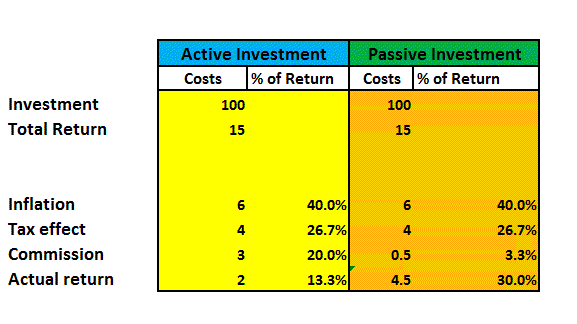Certainly Warren Buffet, an investor par excellence, has been beating the drum of Passive Funds with elevated vociferousness recently. In South Africa, most commentators hedge their bets with a paucity of actual statistics to back their case. A recent article by Patrick Cairns does just that as he nails his mast to the Passive Funds wall.
Main picture: It is your money and your future that is being invested in. Fund Managers will always steer investors towards Active Funds for self-serving reasons: their commission
Note: I have used the term Passive Funds to denote Index Funds throughout
Needless to say, the Active Fund Managers have been extremely critical of the proposition that Passive Funds could achieve superior returns. Their haughty repost is to claim that is it only by the careful selection process through years of training and industry insight that they are able to select those equities which will offer superlative returns.

Whether the Active Fund recommended by one’s Broker achieves a return greater than Passive Funds are the luck of the draw. At 20% chance of beating Passive Funds, Active Funds are no better than gambling
In reality, the converse is true. It has now been definitely proved that whereas a Managed Fund might well substantially outperform a Passive Fund over a short period, over the long haul say 10 years, this is not so. In fact only 20% of Active Funds outperform the market ie the Passive Funds. For the pleasure of only possessing a slender possibility of outperforming Passive Funds, one is burdened with commissions up to 5 times higher.
In this article entitled “Have active managers lost the debate?” Patrick Cairns makes the case against Active Funds.

Saving for a rainy day or retirement must nit be a gamble
Every year S&P Dow Jones Indices publishes its S&P Indices Versus Active Funds (SPIVA) scorecards. It has done this in the US since 2002, and more recently has included other regions as well.
This month it produced its two major scorecards – for the US and Europe – and once again they made difficult reading for active managers. The indices trumped fund managers almost across the board.
Even though the S&P Composite 1500 only returned 1.01% last year that was still a better performance than 74.81% of US equity funds. US large cap funds did slightly better, with 66.11% of them beating the S&P 500.
Over the longer term, these figures look even worse for active managers. Over five years, 88.43% of all US equity funds under-performed the S&P Composite 1500, and over ten years 83.18% fell short of the index.
The following graphic based upon the USA makes the case succinctly:

There are the main causes of this divergence?
A major contributor is fees. If one’s fund earned for example a 10% return. After discounting inflation at a theoretical 6%, the real return is 4%. If an Active Manager charges a 3% commission, they equates to 75% of one’s real return leaving the investor with the proverbial scraps.
What the uninformed investor falls to comprehend is how iniquitiousness of the commission structure. Maybe one’s broker is only charging 1% but then there is usually a platform commission of at least .05%. Finally there is the c0mmission charged by the fund invested in of for example 2%. That equates to 3.5%.
What the Active Fund Manager glowingly reports is that your beat inflation by x%. As the JSE beats inflation in most years, that is a facile comment.

Returns – Active vs Passive Funds
In some cases, like the upfront commission on a lump sum investment that I made with Liberty Life some 20 years ago, was 5%. An unknown broker who on receiving my phone call to invest a R 100 000 bonus, earned R 5 000 for 15 minutes work. In addition he was probably paid a kick-back of 2% for placing the investment in a fund which did not suit me but rather suited his pocket.

Money troubles
If one places one’s investment in a Passive Fund, the fees are substantially lower, normally being around ½% compared to over 2% for Active Funds.

The second factor is that the major investors in the JSE are various funds. On average, all funds will earn the average. Some, a few, will beat the market but it is never more than 20%. In fact the largest fund invested on the JSE is the PIC with in excess of R1 billion.
When one is presented with a smorgasbord of 100s of funds in which to invest in, the final selection is based upon the past performance of those funds.

In any 10 year period, the best performing funds in one year are certainly never a top performing fund over all 10 years. Over an extended period of time, they perform very little different from average. The fund managers all take a view on the future performance of the assets under their control. While some will be bullish on resources others will be bearish. Both cannot be correct. Those funds which were resource bulls a few years ago have seen their value shrink alarmingly over the past two years.

Intrinsically linked to this mathematical exercise of averaging was hinted above in the selection criteria. Unlike a dispassionate index which unemotionally mirrors the market, the Fund Managers attempt to forecast the future direction of the market. Their decisions are rarely ever totally based on fact. Like all people, they are swayed by a host of extraneous factors such as their political outlook, economic sentiment, their relationship with other people et al.
As financial commenters are wont to say, these aspects weigh on the Fund Managers and their decisions.
Whereas Patrick Cairns dispassionately makes the case for Passive Funds, Warren Buffet is more forthright. He makes the case for Passive Funds by claiming that everybody without any financial acumen can beat Active Funds merely by investing in Passive Funds and “then sitting on their rear ends.”

According to Alec Hogg:
The highlight of this segment of the Berkshire AGM comes towards the end when chairman Warren Buffett delivers a masterclass in why Exchange Traded Funds are always going to outperform actively managed portfolio managers. It’s a subject about which the Oracle of Omaha is hugely passionate – and one where he took a $1m personal bet to prove the point. And prove it he certainly has. Eight years into a ten year challenge against the best Wall Street could offer, the performance by Buffett’s simple S&P500 Index tracker is smashing Hedge Funds – by a staggering 40 percentage points (65% vs 22%).
What a ringing endorsement for Passive Funds.
Sources:
Blog by Patrick Cairn entitled. “Have active managers lost the debate?”
Report in the Star on the 3rd May 2016 entitled, “Warren Buffet imparts some wisdom.”

